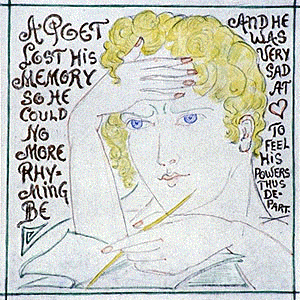Poems
Forty Poems
with Commentary
by the Poets
Todd Davis
Erin Murphy
Editors
(Excelsior/University of New York)

For instance, Fleda Brown writes a poem called "Knot Tying Lessons: The Slip Knot,"
- I skidded like a skater, wrapped around / myself again, burrowing back up through the small / figure-eight I'd made of myself.
Then she tells us of the genesis: she's on sabbatical; she's living in her father's cottage at the shore; she's reading a book on making knots. Why did she write the poem? It "wants to defend me, explain me, to someone."
At times these essays belie or even confound the poems they are meant to reveal. H. L. Hix tells us that his writings "are less Wordsworthian than Wittgensteinian, each poem begins where the last left off, usually in the middle of a sentence, and ends, usually in the middle of another sentence." They follow "a simple syllabic pattern: 12-syllable first line, fourteen 7-syllable lines, 12-syllable last line." Hix proves here that the writer can get bogged down in the all-too-explicit explanations that befuddle more than explain: "By rule every word of the draft had to occur in the source text, so even a ligature like to in the draft came from a passage..." Uh-huh.
But for those of us who are fascinated with the art of constructing a poem, I can't think of a more valuable source than this modest book. Because of my own prejudice --- I am a simple person with simple tastes in simple verse --- I am more attracted to the straightforward and self-deprecating. David Kirby wins our hearts in his "Borges at the Northside Rotary," a poem about reading a poem in front of a local service club.
One of his listeners wants to know "what poetry is, exactly" --- as do we all, I presume --- and when Kirby says that he writes (and reads) only "narrative poetry"
- of the kind performed
by, not that I am in any way comparing myself
to them, Homer, Dante, and Milton
the Rotarian "likes this, he's smiling and nodding / and when I finish my little speech, / he shouts, 'Thank you, Doctor! Thank you...'"
Kirby's commentary on reading in public, reading to Rotarians is a dream. "If somebody said," he reveals in his essay, "'Here's a poem about Rotarians,' you'd be right to expect that it would be a hip and disdainful piece about a bunch of golf-playing businessmen." But, he tells us,
- The Rotarians I know are to be envied, and I'd probably be one if I weren't so jealous of my free time, because they spend their time doing deeds that change the world far more than the swimming pool Marxism embraced by many of my learned colleagues at the university.
Most of the poets here are relatively unknown, although I do recognize one Dinty Moore from my favorite can of stew. A few poems are microscopic ("The construction cranes in New Jersey lowering / an orange-y, egg yolky sun...") whereas some others seem excessive, like G. C. Waldrep's five page "Anniversary."
There are some that --- along with the prose explanations --- can turn tedious. A few of the writers don't seem to see how much they've failed in their verse to create what they claim to want to create in their narrative statements). Others go on too long about technique ... and at least one goes on too long about all the poets and philosophers he has read (Milosz, Emerson, Whitman, Mary Oliver, Stanley Kunitz, Northrop Frye, and that solipsistic Maxine Kumin).
In all, however, Making Poems is a valuable tool, both in prose and in verse ... such that Kirby can publicly (and winningly) ask forgiveness of "Rotarians everywhere." Imagine him reading these very words to a bunch of lunching businessheads in Tallahassee:
- please forgive me,
my brothers, for what I have done to you
and to myself as well
for circumstances so influence us
that it is more an accident
than anything else that you are listening to me
and not the other way around,
and therefore I beg your forgiveness, my friends,
if I wrote this poem before you did.